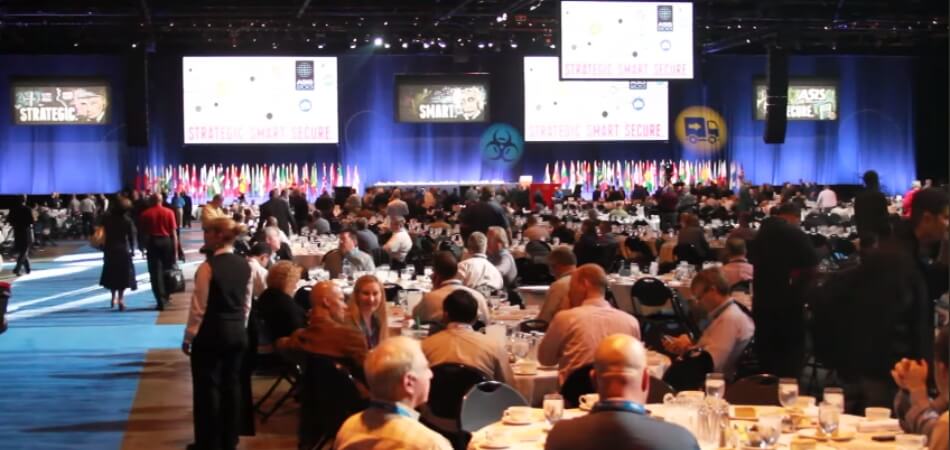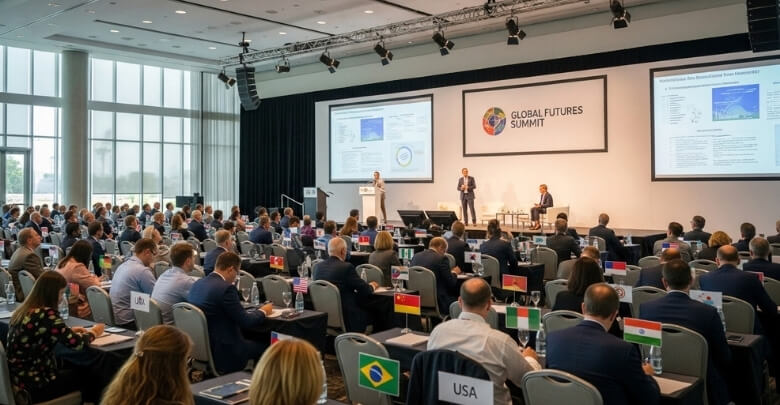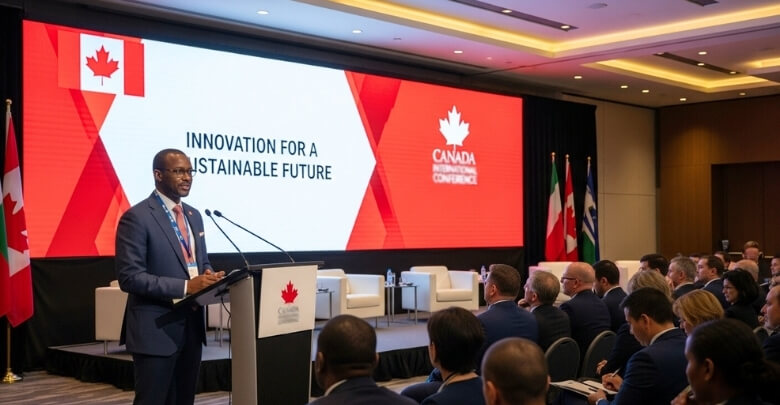An international conference is often seen as more than just a formal event; it’s a space where ideas, cultures, and experiences from around the world come together. These gatherings bring fresh perspectives, spark collaborations, and open doors to conversations that can shape entire industries. At this point, you might be wondering: What is the international conference?
Simply put, an international conference is a large gathering of experts, researchers, and professionals from different countries who come together to share knowledge, exchange ideas, and connect around a common theme. It serves as a bridge between people and disciplines, encouraging global cooperation and pushing the boundaries of innovation.
For anyone attending, the experience goes beyond presentations and discussions. In this article, we’ll walk you through what defines an international conference, how it works, and even share a practical guide and template to help you prepare for one.
What is the International Conference? (Historical Origin)
Many first-time attendees wonder what is international conference and why it matters compared to local events. Unlike local or regional events, a global one unites participants from different countries under one platform, offering opportunities to share research, discuss new developments, and collaborate across disciplines. These conferences are often built around specific themes such as science, technology, business, or education, bringing together people who share common interests and goals.
The idea of international conferences is not new. The first recognized international congresses date back to the mid-19th century, when scientists and scholars from Europe met to discuss topics like chemistry, medicine, and law. Over time, these meetings grew beyond academic circles, expanding to areas such as trade, diplomacy, and cultural exchange. By the 20th century, global gatherings like the United Nations conferences and world expos had firmly established the tradition of international collaboration.
Today, when you attend an international conference, you become part of a global exchange of knowledge and perspectives. A single event might host researchers presenting new studies, industry experts sharing innovations, and students gaining inspiration from thought leaders. This mix of voices sparks fresh ideas, challenges established thinking, and often leads to partnerships that extend far beyond the event itself.
Different Types of International Conferences
International conferences are not one-size-fits-all. They vary widely depending on who organizes them, the field they focus on, and the outcomes they aim to achieve. Some are rooted in academic research, while others are designed for professionals, policymakers, or cultural exchange. Each type brings its own rhythm, format, and benefits. Understanding these differences helps participants know what to expect and how best to prepare before stepping into such a global gathering.
Academic Conferences
Academic conferences are perhaps the most familiar type, especially for students, scholars, and researchers. These events revolve around the presentation of research papers, extended abstracts, and case studies. They serve as a platform to showcase new discoveries, receive peer feedback, and publish findings in proceedings or journals. For many academics, attending such conferences is essential for building credibility, advancing careers, and connecting with others in their field of study.
Professional and Industry Conferences
These conferences are built around specific sectors such as business, technology, engineering, or healthcare. Unlike academic events, they are less focused on publishing research and more on addressing current industry challenges, showcasing new tools, and highlighting emerging trends. Participants include professionals, entrepreneurs, investors, and experts who are eager to network and explore collaborations. Attending one of these conferences can open doors to new partnerships and valuable industry insights.
Policy and Diplomatic Conferences
On a larger scale, policy and diplomatic conferences gather global leaders, government representatives, and international organizations to discuss pressing world issues. Topics often include climate change, economic cooperation, human rights, or public health crises. These events may lead to official declarations, treaties, or collaborative projects with long-term impact. While they may seem distant from everyday professionals, their decisions shape global policies that eventually affect industries, communities, and even individuals worldwide.
Cultural and Multidisciplinary Conferences
Some international conferences move beyond strict professional or academic lines to celebrate culture, creativity, and cross-disciplinary collaboration. These events may include art exhibitions, performances, and interactive workshops alongside discussions. They create space for dialogue between people from different backgrounds, blending knowledge with cultural appreciation. For participants, it’s not only about learning but also about experiencing diversity firsthand and building connections across fields that might never meet in traditional settings.
How an International Conference Differs From a Local Event?
Conferences may serve the same purpose of bringing people together, but the scale, impact, and experience can vary greatly between a local event and an international conference. Local events provide a familiar and accessible platform, while international gatherings offer a much larger stage with global opportunities. Here are the main differences explained:
Audience Reach
A local event usually gathers participants from within a single country or region, which makes it more focused and community-driven. An international conference, however, attracts people from across the globe, creating a mix of cultures and experiences that you wouldn’t find at a smaller event.
Diversity of Perspectives
Participants often share similar backgrounds in local events, so the discussions tend to reflect common regional practices and challenges. At international conferences, you’re exposed to a wide variety of perspectives, which can spark new ideas and broaden the way you approach your own work.
Recognition and Visibility
Presenting at a local event helps you gain recognition within your community and can build credibility at the national level. In contrast, presenting at an international conference gives your work global visibility and adds stronger weight to your academic or professional profile.
Networking Opportunities
Local conferences are excellent for meeting peers, mentors, and professionals within your own country, helping you grow local connections. International conferences expand this network further, giving you the chance to connect with experts, institutions, and organizations from around the world.
Cost and Practicality
One clear advantage of local events is affordability, since they don’t require long travel or complicated arrangements. International conferences, on the other hand, involve extra planning such as booking flights, arranging accommodation, or applying for a visa, though the long-term benefits often outweigh the effort.
Who Attends International Conferences?
International conferences bring together a wide mix of people, each attending for different reasons. From students eager to learn to seasoned professionals looking for collaborations, the diversity of participants is what makes these events so dynamic and valuable. Here are some of the key groups you’ll usually find at such gatherings:
Researchers and Academics
Researchers and scholars form the backbone of most international conferences. They attend upcoming international conferences to present papers, showcase findings, and engage in peer discussions that help refine their work. For academics, these events are also a chance to publish in conference proceedings or journals, which can be important for career progression and recognition. Beyond the formal sessions, conferences allow them to meet fellow experts and explore future research collaborations.
Students and Early-career Professionals
Students, especially those in graduate or postgraduate studies, attend international conferences to gain exposure to the latest trends in their field. For them, it’s about more than just listening—it’s about learning how to present ideas, ask questions, and interact with established professionals. Many conferences also offer reduced registration fees or student-focused sessions, making them accessible entry points for those just starting out in their academic or professional journey.
Industry Professionals and Practitioners
In professional and sector-based conferences, you’ll find business leaders, engineers, healthcare workers, IT specialists, and many others. Their goal is to stay updated on new tools, technologies, and practices that can be applied directly to their work. These participants often look for networking opportunities, potential partnerships, or solutions to challenges they face in their industries. Attending helps them bridge the gap between theory and practice.
Policymakers and Government Representatives
National and international officials often play a key role at policy or diplomatic conferences. They attend to discuss global challenges such as climate change, trade, or public health, and to negotiate agreements that have far-reaching consequences. Their presence ensures that conference discussions can move beyond theory into practical policy-making and international cooperation.
Sponsors, Exhibitors, and Organizations
Another important group includes sponsors, exhibitors, and organizational representatives. They attend to showcase products, services, or initiatives, often through booths, demonstrations, or presentations. For them, conferences are valuable opportunities to connect directly with a targeted audience, increase visibility, and build brand credibility in a global setting.
Common Formats and Activities
International conferences offer far more than a single type of session. Programs often combine formats that educate, inspire, and connect participants. From formal talks by leading experts to interactive workshops and cultural exchanges, each activity serves a unique purpose and adds to the overall experience. Let’s break down the formats and activities you’re likely to see.
Keynote Speeches
Keynote sessions usually set the tone for the entire conference. Delivered by prominent experts or thought leaders, these talks highlight major trends, challenges, or opportunities in the field. A strong keynote not only inspires the audience but also provides insights that guide the discussions throughout the event.
Paper and Poster Presentations
For academic and research-based conferences, paper and poster presentations are central. Participants present their findings, either through formal talks or visual posters displayed during dedicated sessions. These formats allow for detailed explanations, direct feedback, and in many cases, publication in official conference proceedings.
Panel Discussions
Panels bring together multiple experts to discuss a topic from different perspectives. Moderated conversations give the audience a chance to hear diverse viewpoints, while Q&A sessions encourage interactive participation. These discussions often highlight the complexity of real-world issues and provide a space for debate and dialogue.
Workshops and Breakout Sessions
Workshops are smaller, hands-on sessions that focus on practical learning. They give participants the chance to dive deeper into specific topics, practice new skills, or collaborate on problem-solving. Breakout sessions may also run in parallel, allowing attendees to choose the discussions most relevant to their interests.
Networking Events and Cultural Activities
Beyond the sessions, international conferences often include networking dinners, coffee breaks, and cultural programs. These informal settings are where lasting professional relationships are built. They also provide an opportunity for participants to experience the host country’s culture, making the event memorable on both a professional and personal level.
Why Attend an International Conference?
Attending an international conference isn’t just about listening to presentations; it’s about gaining experiences that can shape your academic, professional, and personal journey. These events provide a mix of learning, exposure, and opportunities that few other platforms can offer. Here are eight meaningful reasons why people choose to attend.
Academic Recognition
Presenting at an international conference allows researchers and students to showcase their work to a global audience. This not only strengthens academic profiles but also provides opportunities for publication in proceedings or journals. Recognition gained here often supports career advancement, scholarships, or further research opportunities.
Networking Opportunities
One of the biggest draws of international conferences is the chance to meet people from around the world. Whether it’s academics, industry leaders, or policymakers, these connections often grow into long-term collaborations, partnerships, or even mentorships. Networking in this setting helps broaden both professional and personal horizons.
Exposure to Global Perspectives
Conferences bring together participants from diverse backgrounds, each offering unique viewpoints. Listening to how challenges are approached in different countries or industries gives attendees a more well-rounded understanding of their field. This diversity of thought often sparks creativity and new ways of problem-solving.
Staying Updated on Trends
In fast-moving fields like technology, business, or healthcare, staying updated is essential. International conferences highlight the latest research, tools, and strategies, giving attendees early access to knowledge that may not yet be widely available. This ensures participants remain ahead of the curve in their professions.
Career Development
For professionals, conferences often open doors to career opportunities. Recruiters, employers, and organizations frequently attend to scout for talent or discuss collaborations. Engaging in workshops, panels, and networking events helps participants position themselves better in the job market and explore new professional paths.
Cultural Exchange
Beyond academic and professional growth, international conferences offer exposure to different cultures. From informal gatherings to cultural tours organized by hosts, these experiences deepen cross-cultural understanding. This makes the event not only educational but also personally enriching, as participants carry home memories and perspectives from diverse communities.
Confidence and Communication Skills
Speaking in front of an international audience, engaging in Q&A sessions, or even networking with strangers builds confidence and sharpens communication skills. These experiences develop public speaking ability, clarity of thought, and adaptability — qualities that are valuable in both academic and professional life.
Inspiration and Motivation
Finally, international conferences can be deeply inspiring. Listening to thought leaders, engaging in debates, and being part of a global conversation often leaves participants with renewed energy. This motivation can push students to pursue research, professionals to innovate, and organizations to adopt new ideas.
How to Participate in an International Conference: Step-by-Step Process
Getting ready to attend an international conference can feel overwhelming at first, especially if it’s your first time. From submitting your abstract to arranging travel, each step matters for a smooth experience. Here’s a simple guide to help you navigate the process with confidence.
1. Find the Right Conference
Start by searching for events in your field using academic platforms, professional associations, or official conference websites. Make sure the theme matches your research or professional goals. Checking past conference editions can also give you an idea of quality and reputation.
2. Review the Requirements
Every international conference has its own submission deadlines, guidelines, and eligibility criteria. Carefully read the call for papers or participation rules so you don’t miss out. This is also the time to decide whether you’ll join as an author, listener, or exhibitor.
3. Prepare and Submit Your Abstract
If you plan to present research, preparing a clear abstract is the first step. Follow the formatting rules provided by the organizers. Once submitted, your abstract will go through a review process, and if accepted, you’ll be invited to register as an author.
4. Complete Registration
Register early to secure your place and take advantage of discounted fees, if available. International conferences often offer categories such as author registration, listener registration, or student registration. Completing this step ensures your spot in the program.
5. Receive Your Invitation Letter
Once your registration is confirmed, you’ll receive an official invitation letter from the organizers. This document is crucial if you need to apply for a visa, as it proves the purpose of your travel. Keep both digital and printed copies, as embassies and immigration officers may request them during the process.
Here’s what a conference invitation letter looks like:
[Conference Organizer’s Letterhead or Logo]
[Organizer’s Address]
[City, Country]
[Email | Phone Number]Date: [Insert Date]
To: [Full Name of Participant]
[Participant’s Address]
[City, Country]Dear [Full Name],
On behalf of [Organizer’s Name/Institution], it is our great pleasure to officially invite you to attend the [Conference Name], which will take place from [Start Date] to [End Date] at [Venue, City, Country].
You are invited to participate as a [Author/Presenter/Listener/Delegate], and we are delighted to welcome your contribution to this international gathering. The conference will bring together researchers, professionals, and experts from around the world to share knowledge, discuss new developments, and foster collaborations across disciplines.
This letter also serves as an official confirmation of your registration and may be used to support your travel and visa arrangements. Should you require further details or assistance, please do not hesitate to contact us at [Organizer’s Email/Phone].
We look forward to your valuable participation and wish you a pleasant journey to [Host City].
Sincerely,
[Authorized Person’s Name]
[Designation]
[Conference Organizer/Institution Name]
6. Arrange Travel and Visa Documents
If the event is abroad, gather the necessary travel documents in advance. This often includes applying for a visa, using your invitation letter, and preparing supporting documents like accommodation bookings. Getting these steps done early avoids last-minute stress.
7. Prepare Your Presentation or Materials
Whether you’re delivering a paper, presenting a poster, or showcasing a project, take time to refine your materials. Practice your talk, prepare your slides, and ensure your content fits within the allotted time. A polished presentation will leave a lasting impression.
8. Engage During the Conference
Don’t just attend sessions — participate actively. Ask questions, take notes, and connect with people during breaks. Networking sessions, cultural events, or even informal coffee chats can lead to valuable connections and collaborations.
9. Follow Up After the Event
After the conference, follow up with the contacts you made. Share your slides or research if requested, and stay engaged with professional groups or mailing lists. This helps turn short-term connections into long-term opportunities.
Here is an example of a follow-up email you can use:
Subject: Great to Connect at [Conference Name]
Dear [Recipient’s Name],
I hope this message finds you well. It was a pleasure meeting you during the [Conference Name] held on [Dates] in [City, Country]. I truly enjoyed our conversation about [specific topic you discussed] and found your insights very valuable.
As we discussed, I would be happy to share [your slides, paper, or additional information], and I look forward to exploring possible ways we can stay in touch or collaborate in the future.
Thank you once again for your time, and I hope we can continue this connection beyond the conference.
Best regards,
[Your Full Name]
[Your Institution/Organization]
[Your Contact Information]
Tips to Identify the Right International Conference for You
Choosing the right international conference can be a daunting task, given the plethora of options available. Identify a conference that aligns with your professional or academic goals. The right conference can offer immense benefits, from knowledge gain to networking opportunities.
- Relevance to Your Field: Ensure the conference theme aligns with your area of expertise or interest. A relevant conference will offer more meaningful learning and networking opportunities.
- Quality of Speakers: Research the speakers and their credentials. High-caliber speakers often indicate a conference’s quality and the level of discourse you can expect.
- Networking Potential: Consider the networking opportunities the conference offers. Look for events that attract professionals or academics you aspire to connect with.
- Past Attendees’ Feedback: Seek feedback from past attendees about their experience. Their insights can reveal a lot about the conference’s value and organization.
- Organizer’s Reputation: Investigate the reputation of the organizing body. A reputable organizer ensures a well-planned, high-quality event.
- Cost and Location: Analyze the cost-benefit ratio, including travel and accommodation expenses. Ensure the investment is justified by the potential gains from attending.
- Conference Length: Consider the conference duration since it can be a single day, two days, or multiple days. Understand the average duration of international conferences and select a conference that matches your schedule.
- Conference Size: Decide whether you prefer a large-scale event or a more intimate setting. The size of the conference can impact the type and quality of interactions.
Selecting the right international conference requires careful consideration of several factors. It’s about finding a balance between the conference’s relevance, the quality of content and speakers, and logistical aspects like cost and location. Making an informed choice ensures that you derive maximum benefit from your conference experience.
Frequently Asked Questions
Attendees and conference enthusiasts from different regions of the world often inquire about the international conference. There are more questions along with ‘What is the international conference?’ Here are a few questions and their respective answers relevant to the international conference.
Who Can Attend an International Conference?
International conferences are open to a wide range of attendees, including academics, professionals, students, researchers, and business leaders. Participation may require registration, and some conferences may have eligibility criteria depending on the target audience.
What Are the Benefits of Attending an International Conference?
Attending an international conference offers numerous benefits, such as gaining access to the latest research and developments in a particular field. It is also an opportunity to network with experts, peers, and thought leaders from around the world. Attendees can also share their work, receive feedback, and explore potential collaborations.
What is the Typical Structure of an International Conference?
An international conference typically follows a structured format that includes keynote speeches from prominent figures in the field, paper presentations, panel discussions, workshops, and networking sessions. Some conferences may also feature poster sessions or exhibitions.
How Are International Conferences Organized?
International conferences are usually organized by academic institutions, professional associations, or research organizations. They require extensive planning, including selecting a theme, inviting speakers, arranging the venue, and coordinating the schedule of events.
Can I Attend an International Conference Virtually?
Yes, many international conferences now offer virtual or hybrid formats that allow participants to attend remotely. Virtual conferences provide the same opportunities for learning and networking, although the experience may differ from in-person attendance.
Bottom Lines
International conferences stand out as powerful spaces where knowledge, culture, and collaboration meet on a global stage. They bring together people from different countries, fields, and backgrounds, creating opportunities that extend far beyond the event itself. Whether you’re a student, researcher, or professional, joining one can open doors to recognition, partnerships, and fresh perspectives that shape both careers and communities.
By now, the question of what is the international conference should feel much clearer. It is not just a gathering but a platform for global dialogue, innovation, and growth. As you prepare for your own journey, remember that each step from submitting an abstract to networking after the event is part of an experience that can leave a lasting impact.









